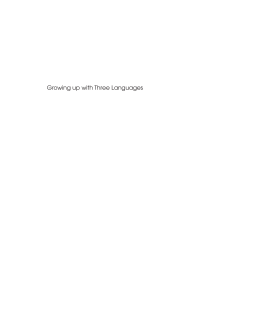
Additional Information
Book Details
Abstract
This book is based on an eleven-year observation of two children who were simultaneously exposed to three languages from birth. It tells the story of two parents from different cultural, linguistic, and ethnic-racial backgrounds who joined to raise their two children with their heritage languages outside their native countries. It also tells the children’s story and the way they negotiated three cultures and languages and developed a trilingual identity. It sheds light on how parental support contributed to the children’s simultaneous acquisition of three languages in an environment where the main input of the two heritage languages came respectively from the father and from the mother. It addresses the challenges and the unique language developmental characteristics of the two children during their trilingual acquisition process.
This book sends an encouraging message to immigrant, inter-cultural, and inter-racial parents: Raising children with heritage languages and cultures is an important element in childrearing.
Carmen S. Rodriguez, Multilingual advocate, Arizona
This wise and engaging book is rich with detail on how normal multilingual acquisition works, where the challenges lie, and why raising children in multiple languages is worthwhile. I want to hand this book to my kids: “See? This is what we’ve been trying to accomplish.”
Sharon Flank, Ph.D., Linguist and mother of two bilingual daughters (English/Russian), Washington, D.C.
Packed with research, advice and personal accounts of trilingualism, this book will quickly become every multilingual family's treasure trove. Written specifically with the multilingual parent in mind, it is easy to read, full of real-world experiences, and replete with researched facts and wisdom: an essential read for any family raising children in more than two languages.
Corey Heller, Editor-in-Chief, Multilingual Living Magazine
This a must-read book for any parents who wish to raise children with more than one language. The useful strategies provided by the author help parents raise happy children while passing their heritage languages and cultures.
Ping Huang, father of a trilingual child (Chinese/English/Spanish), Shanghai
The book, part of the Parents’ and Teachers’ Guides series published by Multilingual Matters, is written in a highly reader-friendly, non-technical and comprehensive style making it accessible to readers from all walks of life. It draws on the unfolding, entertaining story of an actual family, yet it is academically rigorous with details of evidence and data typical of research work…This book is highly worthwhile reading for parents, educators and researchers. It is useful not only for families with three or more languages but also for any bilingual or monolingual diasporas who can also benefit from understanding the role of multilingualism in children’s language learning and identity development.
Hongyan Yang, Department of Linguistics, Macquarie University
Wang has written a highly readable and entertaining real family story but it is much more than that. It is an encouraging and supportive book for parents not only through the real family story but also through its description of how to plan, steps to take, developmental information, description of successes and difficulties, related to language, culture and development. It is worthwhile for educators as well; a scholarly well referenced work in the genre of Gnyx T Wrk.
Carol Keyes, Ph. D. Professor, Parent, Early Childhood Educator/Consultant, New York
This book is hugely enjoyable! It is written in a highly accessible style, and yet it is academically rigorous. The author has a profound understanding of the linguistic, social, cultural and psychological aspects of trilingualism and uses her large corpus covering more than 10 years of trilingual interactions in a family setting as an illustration of successful trilingual development. The book reads like a novel: the characters are two determined parents, one Chinese and one Swiss, and two biracial and trilingual boys growing up in New York, proud of their unique identity. The author presents different perspectives: the parents’ view, the children’s opinions about their multilingualism, and the researcher’s perspective. She draws excellent conclusions for prospective parents of multilingual children and has a clear message to those who doubt that multilingualism can work: it is possible, her children developed superior cognitive and communicative skills, but it involves a constant, unrelenting effort from the parents’ part.
Dr. Jean-Marc Dewaele, Department of Applied Linguistics, Birkbeck, University of London
Dr. Xiao-lei Wang is currently a tenured, full professor at Pace University, New York. She was born and grew up in the People’s Republic of China and came to the United States on a graduate scholarship awarded by the United Nations. She received her Master’s degree from the Erikson Institute in Chicago and her Doctoral degree from the University of Chicago. Dr. Wang has conducted research in different cultural communities and worked with children and parents of immigrant and multilingual families. Dr. Wang has traveled in many parts of the world and studied languages such as English, French, Russian, and Japanese. She also speaks several Chinese dialects in addition to Putonghua (“standard” Chinese).
Table of Contents
| Section Title | Page | Action | Price |
|---|---|---|---|
| Dedication | v | ||
| Prologue | vi | ||
| Contents | vii | ||
| Acknowledgements | xv | ||
| Introduction | 1 | ||
| Chapter 1 The Complexity of Trilingualism | 13 | ||
| Chapter 2 In the Beginning | 40 | ||
| Chapter 3 The Home Years | 58 | ||
| Chapter 4 Transition from Home to Preschool and Kindergarten | 108 | ||
| Chapter 5 The Elementary School Years | 136 | ||
| Chapter 6 Identity and Personality Development: Children’s Voices | 171 | ||
| Chapter 7 Concluding Remarks | 194 | ||
| Epilogue | 209 | ||
| Appendix: Useful Websites for Parents | 210 | ||
| Index | 211 |
